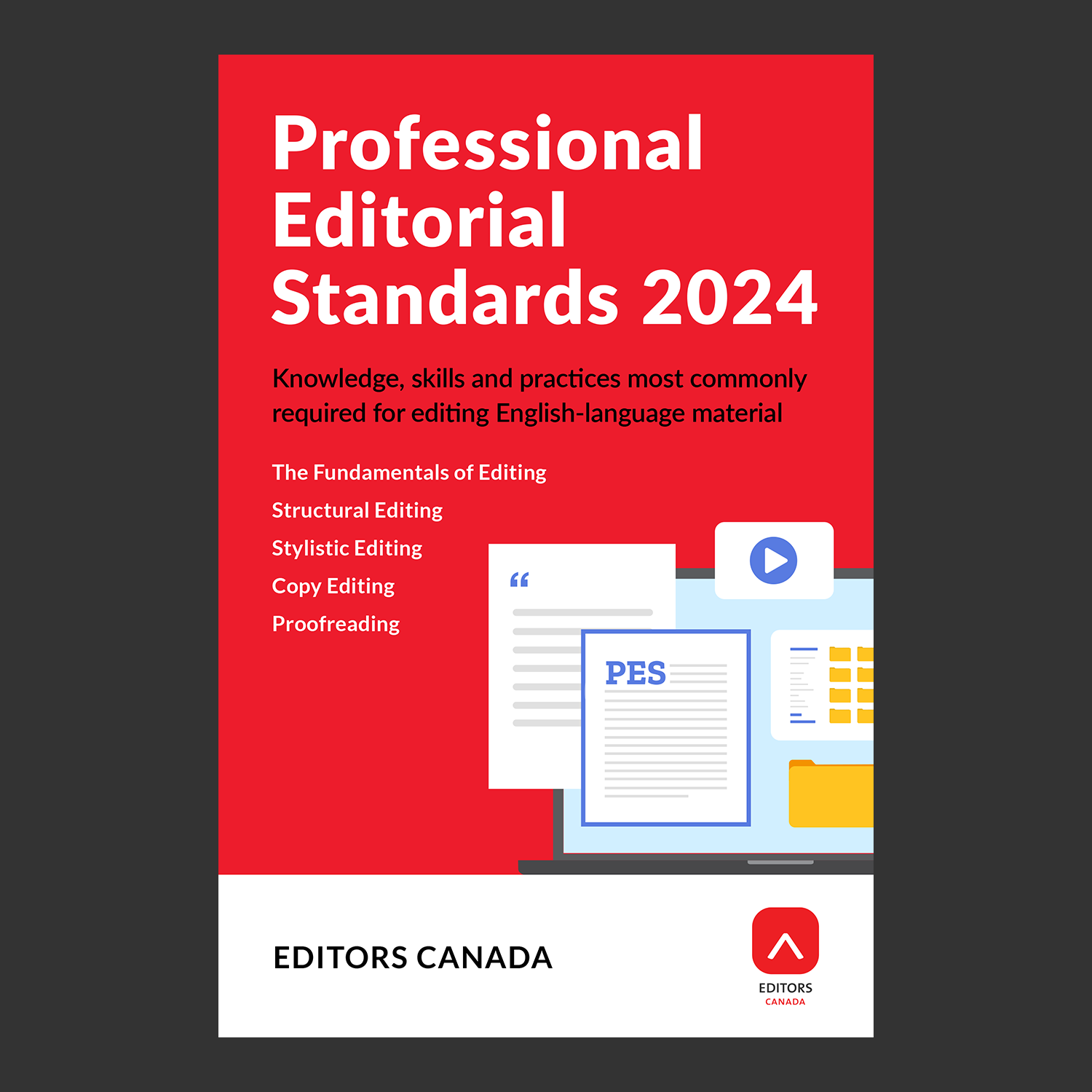In a field where being clear and consistent is everything, it’s surprisingly hard to get everyone on the same page about what any one role or stage in publishing involves. Enter the Professional Editorial Standards (PES)! Rather than getting bogged down in grammar rules, standards like this newly overhauled set are about the kinds of checks and concerns addressed at each stage of editing.
Whose job is it?
The original 1980s PES laid a common ground for everyone from managing editors right on through to proofreaders. Before then, the various roles existed, but each person and workplace defined what each meant for themselves; any title or stage could involve just about any scope. The PES enumerate the ways in which a “proofread” is not a “light edit,” for example. Moreover, the PES were a necessary first step in identifying adept and expert editors of all flavours, setting parameters for education, assessment and contracts.
Last year’s PES update (just now released publicly) is a complete overhaul. It includes 58 brand new standards, about 48 that address ethics and “professional behaviour” and streamlining of overlapping concerns, resulting in 150+ standards.
Previously, it comprised 67 standards that addressed only the division (and overlap) of concerns about content, suitability to the audience and publishing law (like copyright and plagiarism). These issues go beyond books; they are relevant across products ranging from websites to packaging and resumés to research papers.
Who’s a good editor?
Imagine, if you will, not using spell-check but instead looking up every word in a paper dictionary. That might be deemed an “unethical” practice under the new standards, because that method is so inefficient. By adding standards about keeping up skills (A14.1) or learning new tactics and tools (Part A, intro), as well as setting realistic deadlines (A2.2) and choosing the changes that will be the least costly (E1.8) in order to do the best for clients, the PES raise the standing of the editing profession overall.
The “behavioural” and ethical standards (such as A & A2.4, A4.7, A5.7, A11.2, A11.3 and A14) are most interesting to me because they put editing on the same professional playing field as law and medicine, for example, which have similar standards of practice.
Ethics among colleagues
Anyone can see the practicality of saying that every editor must understand the legal and ethical dimensions of editing/publishing (A7.1, A8.2) but why do professionals need standards like A1.2, A1.4, or A12.3, which detail treating each other with tact and basic respect? Why does a standard need to spell out that using relationships to profit should not be done without explicit approval (A8.3)?
I can’t speak for the committee (and they did not reply to my inquiries), but I can imagine that having such standards sets a framework for excluding violators from professional membership. As previously said, these standards may also help form the basis for editing to be formally recognized as a profession, as both law and dentistry are.
Adding IDEA standards
Using language consciously to respect all people is a growing concern. Many standards have been added that relate to IDEA (a recasting of EDI to cover inclusivity, diversity and equity as well as accessibility, which the PES separates). A8.2 formalizes the goal of knowing “who is excluded” and A9.1–3 address cultural stereotypes and other offensive content as something editors will flag, at minimum.
This doesn’t mean that every word editors are involved with will end up being sensitive and respectful (we don’t get final say, after all), but it does mean that editors have a duty to let the creators know where concerns might be raised. How they address such concerns is out of our control.
Beyond editing
Even concerns somewhat tangential to editing are included in the PES. For instance, fact-checking, permissions seeking and intellectual property law are professional realms unto themselves, but editors do dip into such concerns as part of their professional practice in other stages of publication. The PES help draw boundaries around what an editor might reasonably be expected to do in these realms and what is best covered by specialists.
For example, “in each of the first three stages of editing,” wrote project lead Berna Ozunal in an earlier post, “we flag things like anachronisms at structural editing, usage errors at the stylistic stage and calculation errors at copy editing; this is not as extensive as a separate fact-check but still would be built into each edit.”
How will you use the PES?
Will these standards become your own guideposts? Will they help steer your professional development? Will you refer to them in your contracts and negotiations? Read them over, and let us know.
___
Previous post from Adrienne Montgomerie: PerfectIt 3: Quality Software for the Experienced Editor
The Editors’ Weekly is the official blog of Editors Canada. Contact us.
Discover more from The Editors' Weekly
Subscribe to get the latest posts sent to your email.
